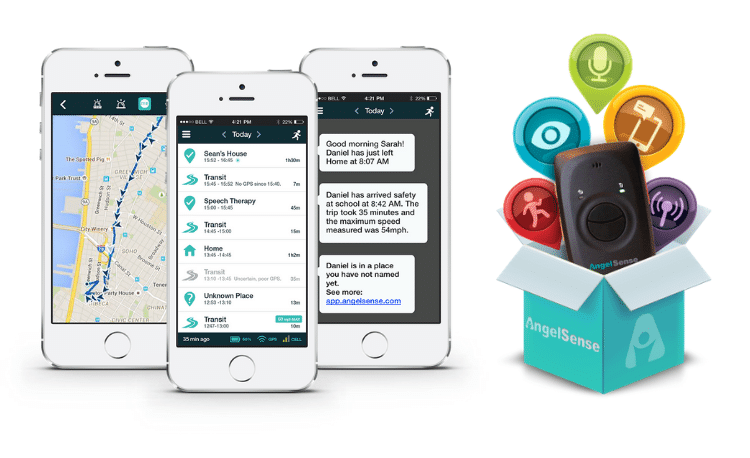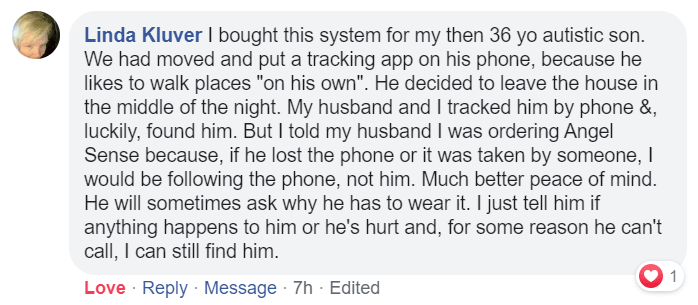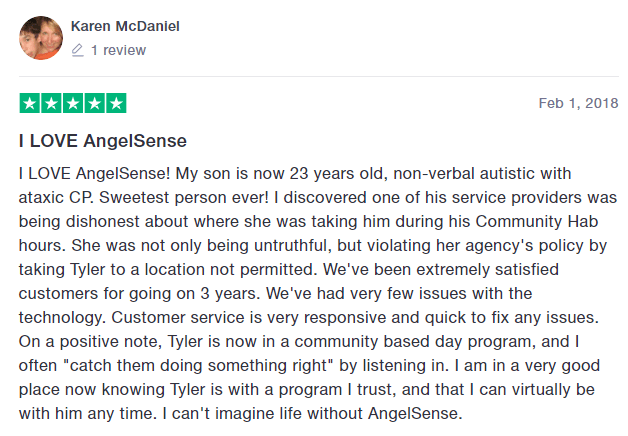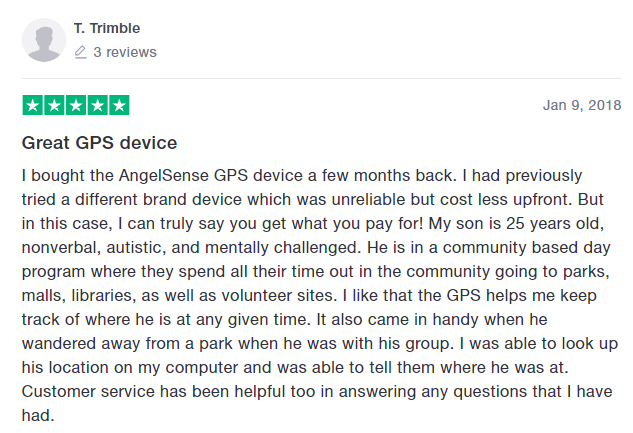Aging Out: When Your Child with Autism Becomes an Adult
January 26, 2020Having a child with autism can mean a lifetime of learning how to be prepared and best help your child throughout the different stages of life. Although all parents encounter this to some degree, when your child has special needs you may end up being much more involved than you would for a neuro-typical child.
We’ve put together some helpful information, a few tips, and where you can get support for your child as they transition from child to teen to adult. Included are tips to care for autistic adults, for college, entering the workforce, independent living and more.
It’s important to remember that this transition can be a stressful time for you, them, and their siblings. The more you plan and have discussions and prepare, the easier it will be on your entire family. You might also want to check out how AngelSense GPS helps with Independence and Employment Success.

Getting Started with Transitioning out of High School
Usually, between the ages of 14-16, parents of children with autism and special needs start planning for the end of high school. This is the age when it starts becoming a part of your child’s IEP. You’ll notice a shift toward setting goals and planning for what comes next. This obviously depends on your child’s abilities, interests, and needs. It usually includes discussions about college, vocational training, independent living, employment and all of the factors each of these steps involve.
Special education often continues until 21 years of age and each state has its own requirements and plans for transitioning. Some states start the process even before age 14. Regardless of your state, all children with an IEP must have a transition plan in place by age 16. It is also required that your teen be included in all IEP meetings once discussions about their future begins. Autism Speaks has useful information by state on their Transition Tool Kit page.
Depending on your child’s abilities, one of the most important things you can do is help your child is to start thinking about and identifying their goals and dreams. Speaking openly about their future and what they want will give you a place to start when considering options.
What to Expect Before Your Child with Autism Turns 18
As much as many of us would like to stick our heads in the sand and not face the inevitable fact that our children are growing up, it is something we have to take seriously especially when our children have special needs. Some of our children will never be able to live independently, some will require quite a bit of assistance to do so, and some will go to college and manage to live on their own. However, no matter how self-sufficient they are able to become, there is still a level of support they should all receive.
Some of the things to start thinking about as your child gets older are:
- Guardianship or Conservatorship: It is important that you start discussing the options with your child and therapist, so you can get everything ready before they turn 18.
- Housing: Many states have assisted living facilities for those with special needs, but it’s important to get on waiting lists early, even if you’re not sure. In some states, it can take several years to be placed.
- College: The earlier you start discussing your child’s interests and what they want for their future the better. Researching schools, programs, and requirements for admission takes time and planning.
- Employment: Many special needs students start vocational training a few years before graduation. Again, it’s never too early to start looking into your state’s programs and beginning discussions with your child about their interests.
- Health Insurance: This is a crucial step that can be quite costly, so it’s important to consider when planning for your child’s future. Before 18, you should apply for Medicaid, Social Security Benefits, and Social Security Disability Insurance. Keep in mind that if your child doesn’t go to college, it is very likely they won’t be covered by your insurance after they turn 19.
Other things to remember are registering to vote, signing up for the draft (even if you have to do it for them as their guardian), opening a bank account and teaching them how to use it, and going over documents like their birth certificate and social security card.
Without guardianship or conservatorship, you will not be able to participate in your child’s health-related decisions. If you will not be filing for guardianship, you may want to consider having them sign a healthcare proxy and power of attorney. Health insurance companies may also require that you fill out permission forms, even if they are on your policy your rights to information cease as soon as they turn 18.

Preparing for College with Autism
Some of the most brilliant minds are those with autism. College may very well be a viable next step in your child’s venture into adulthood and independent living. When choosing a school it is important to not only look into the specific programs that are of interest to your child, but to also check what the school offers in terms of special needs support.
Many colleges and universities have resources and programs to help special needs students succeed academically, socially, and after graduation. Having support can make a huge difference for your young adult’s future.
Starting early and visiting schools can be a critical step for a child with autism who is considering the college path. This helps with the decision process and figuring out where they feel the most comfortable. The more familiar your child is with the school and campus, the easier the adjustment will be.
It is also a good idea to get a headstart looking into financial aid, scholarships, and grants for special needs students. Here’s a list of scholarships for students with autism.
If you are not going to file for conservatorship or guardianship, make sure to have your child sign a FERPA waiver. This way the school will be able to discuss issues with you. Without it they won’t be able to discuss anything with you, even if there are mental health concerns.

Vocational Training for Autism and Preparing for Employment
If they are able, you may consider having your child work part-time or do an internship while still in high school. This will help them adjust to a work environment while they are still living at home. Gradual changes are usually best and starting to work is a huge transition.
The earlier you start talking about what types of jobs your child would enjoy, the more time you’ll have to help them build the skills necessary. Sometimes it takes some creativity to match your child’s interests and abilities with a job. If they tell you they want to be something that is beyond their abilities – like an NFL player – you can suggest jobs related to that profession – like working at a football stadium.
When thinking of job skills to develop, make sure to include things like communication skills, interpersonal skills, decision-making skills, and learning skills. Some things to work on are critical observation, problem-solving, guiding others, active listening, following instructions, cooperation, and conflict resolution.

Moving Out – Independent Living for Autistic Adults
Independence is something a lot of young adults with special needs struggle with as they get older. It is difficult as parents to find the balance between keeping their child safe and protected, while still finding ways to instill a sense of freedom and independence. Between 18 and 25, many young adults with autism move out of their parents’ homes.
Whether your child is going to college and wants to live in the dormitories or is entering the workforce and wants to move into an independent living facility, it is undeniably a huge turning point in all of your lives. Some of the options to consider include:
- Independent Living: Having their own apartment or house with little support.
- Supported Living: Sharing their own apartment or house with a support worker or having them live nearby.
- Supervised Group Living: Group homes where several individuals with autism or special needs live together with a professional staff to assist them.
Financial Resources for Adults with Autism
The federal and state governments have several programs to help with the cost of living expenses for those with disabilities, including autism. Look into HUD, for low-income housing assistance, Supplemental Security Income (SSI), Medicaid waivers, the Affordable Care Act, SNAP for food, etc.
If you’re going to financially help your child once they become an adult, you may want to set up a trust. If written correctly, a trust can ensure that your child doesn’t lose government benefits. There is also a law (ABLE) designed to allow people with disabilities to build a savings account up to a certain amount without affecting their Medicaid and other government benefits.
There are also several local and national groups and organizations with resources and support programs in place to help autistic adults. The following organizations are known to support the adult autism community: Easterseals, The Organization for Autism Research, The Autism Society of America, The Asperger/Autism Network, The MIND Institute, Autism Speaks, The National Autistic Society (UK), Autism Canada.
When Your Adult Child with Autism Lives at Home
Living at home is sometimes the best option for your adult child with autism. If needed, families may opt for an in-home caregiver or respite care for support. When your child isn’t able to live independently, there are still day programs and camps that can help foster a feeling of independence.
In these cases, you will probably consider filing for full guardianship. This is an important step in protecting your loved one who can’t care for themselves. Everything from being involved in medical care and decisions to being able to use a GPS tracking device will be affected if you do not have court-ordered full guardianship.

Teaching Self-Advocacy and Other Skills for Success Out in the World
As higher functioning children get older, it becomes important to teach skills that will help them navigate the outside world without the type of support they’ve received thus far. Self-advocacy revolves around helping a child understand that they have autism and how and when to communicate that to others.
By starting this process early, they will be better prepared to enter a work environment or college and ask for the support they need to be successful. The more they understand their strengths and challenges, the easier it will be for them to communicate this to teachers, bosses, coworkers, roommates, etc.
This is also very helpful for those with sensory sensitivities. Teaching them about their specific sensory requirements and how to ask for accommodations can be a critical step in successful independence.
Teaching young adults with autism about their rights, special laws that protect them, programs available to them, and how to ask for and get support when they need it can help ensure a successful transition into adulthood. It is also good to openly discuss mental health, stress, anxiety, depression and other symptoms that often go along with having autism and facing major life changes.
Self-advocacy should always be empowering and focused on your child’s strengths, but it should not downplay the diagnosis and how it affects them. By being able to express their needs in a positive way they’ll be better able to cope with real-life situations as they arise.
Aging Out and Continued Care for Adults with Autism After Age 21
Throughout primary school and even college, many services and accommodations are made for children who have special needs. Unfortunately, the transition to adulthood means a lot of the support ends especially after age 21. This is what is commonly known as aging out.
Many states have programs for adults with disabilities, but they have to be applied for and there may be waiting lists. This is why it’s important to do your research and know the options before your child becomes an adult. There are definitely gaps when it comes to getting support once your child with autism reaches adulthood. The earlier you start planning, the easier it will be to identify and address those gaps.

How AngelSense Can Help Keep Your Child with Autism Safe During Transitions
When your child grows up and wants more independence it can be a particularly stressful time for parents of children with autism. As your child starts to go out into the world by themselves, you can have peace of mind knowing where they are and that they can check in with them with the AngelSense GPS for autism.
AngelSense helps with strengthening independence skills, building trust, and gradually giving your child more and more independence. Many parents use it as a back-up to their young adult’s phone, finding relief in the fact that if they lose their phone or the battery dies, they still have a way to find and communicate with them.
During transitions, our customers have turned to AngelSense to gain the confidence needed to allow their children more freedom and independence. The peace of mind that comes with knowing they can easily locate their loved one and communicate with them or listen-in to their surroundings if something happens is truly a game-changer. During major life changes, it also helps the child to know that they are safe and their parents are still protecting them.
Our autism moms who make up our AngelSense Customer Care Team mentioned that they love using AngelSense for their older children. One of the main concerns they had before using the device is that when their children get overwhelmed their ability to use a cellphone is often hindered. AngelSense provides them an added level of protection for when their loved ones need them most.
They also saw a decrease in behavioral issues at home because it allowed their teens and young adults more freedom and the ability to go out into the world more frequently. As your child gets older their desire to go out and experience new things increases, no matter what level of functioning they are. When you have a safety precaution in place like the AngelSense GPS, it is easier to make more compromises to give them more leeway.
For those who are non-verbal or have more severe symptoms, having the AngelSense wearable GPS device can make them feel like they have a phone like everyone else. It also is a great way for therapists or caregivers to get ahold of you, as many of them are not permitted to have their cellphones with them while they’re working. They can simply press the Call Request button so you’ll know they need you. You can then use the 2-Way Assistive Speakerphone on the device to speak with them.
Keep in mind that without consent, it is illegal to use a GPS tracker for your child once they turn 18 unless you have court-ordered guardianship. Many of our customers report that their older children readily give permission because they feel better knowing their parents can help them if something happens. They also like knowing that it puts their parents’ minds at ease.
Here are Some AngelSense Reviews from Customers Caring for Young Adults:




